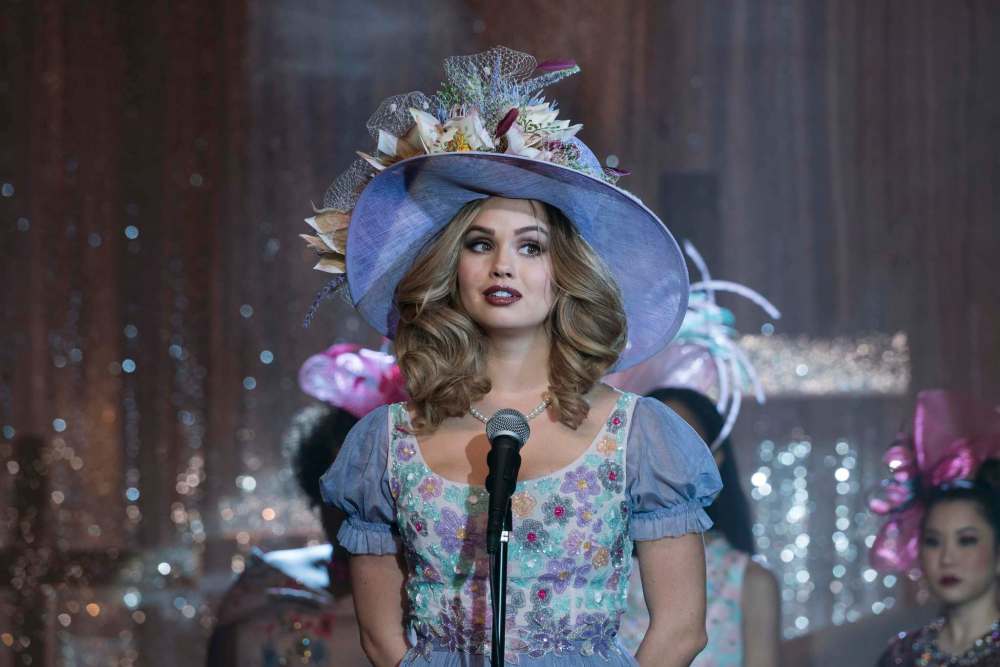In poor taste
At the overstuffed buffet of all-you-can-eat TV, Netflix's Insatiable is a skippable dish
Advertisement
Read this article for free:
or
Already have an account? Log in here »
To continue reading, please subscribe:
Monthly Digital Subscription
$0 for the first 4 weeks*
- Enjoy unlimited reading on winnipegfreepress.com
- Read the E-Edition, our digital replica newspaper
- Access News Break, our award-winning app
- Play interactive puzzles
*No charge for 4 weeks then price increases to the regular rate of $19.00 plus GST every four weeks. Offer available to new and qualified returning subscribers only. Cancel any time.
Monthly Digital Subscription
$4.75/week*
- Enjoy unlimited reading on winnipegfreepress.com
- Read the E-Edition, our digital replica newspaper
- Access News Break, our award-winning app
- Play interactive puzzles
*Billed as $19 plus GST every four weeks. Cancel any time.
To continue reading, please subscribe:
Add Free Press access to your Brandon Sun subscription for only an additional
$1 for the first 4 weeks*
*Your next subscription payment will increase by $1.00 and you will be charged $16.99 plus GST for four weeks. After four weeks, your payment will increase to $23.99 plus GST every four weeks.
Read unlimited articles for free today:
or
Already have an account? Log in here »
Hey there, time traveller!
This article was published 20/08/2018 (2636 days ago), so information in it may no longer be current.
Some new TV shows have the burden of living up to the hype. Others, such as Insatiable, have the burden of living up to the backlash.
When the trailer for the new Netflix original series arrived online last month, the outrage was swift (although, in 2018, is there any other kind?).
The premise of the show looked deeply problematic: the protagonist Patty (played by Debby Ryan) is an overweight teen who is mercilessly bullied. Then she gets punched in the face, has to have her jaw wired shut, loses all the weight, and is looking to exact revenge — in her new “revenge body,” of course. Tale as old as time!

People began calling the show out on social media, calling it toxic and fatphobic. An online petition calling for Insatiable’s cancellation, now more than 230,000 signatures strong, began circulating online — all before the show had even started streaming.
The show’s creator, Lauren Gussis, begged people to give her show a chance. Which, of course, is fair. It is hard to judge a show on a trailer, even if that trailer is very offensive.
Insatiable debuted Aug. 10. Is it really the “worst show on Netflix”?
Let’s put it this way: I struggled to make it through the first two episodes before thinking, “You know what? Life really is short.”
The issues with this show are myriad. For one, it falls face first into the very tropes it purports to satirize. Patty’s very obvious binge-eating disorder is not treated with nuance, nor is her relationship to her changing body.
To be fair, there are blink-and-you-miss-them glimmers of diet-culture commentary here — but they are lost to all the talk of fat being something to be feared and avoided. In this universe, fat is failure and eating disorders are little more than character flaws. Which, you know, is a great message to send to the teenagers to whom this show is ostensibly geared.
Patty learns, early on, that skinny is not, in fact, magic, as the title of Episode 2 suggests — but the show upholds another status quo. As Sophie Gilbert writes at the Atlantic, “The most depressing part of Insatiable isn’t that Patty’s thinness brings her happiness. It’s that it brings her power.”
Then there’s the plot about pageant coach Bob Armstrong (played by Dallas Roberts), who is falsely accused of molestation by a pageant mom who literally points her finger at him and yells, “He touched her hoo-hoo!” in an auditorium.
Nevertheless, Bob begins working with Patty, and Patty, oddly, wants to seduce him?
The show is a mess, hampered by too much unnecessary narration, absurd plotlines, juvenile humour (there’s a bit about anal cancer) and characters we simply don’t care about — save for Nonnie (played by Kimmy Shields), Patty’s voice-of-reason best friend. But even Nonnie is shortchanged: she’s clearly questioning her sexuality, and it’s played for laughs.

Insatiable is trying, clearly, to position itself as a subversive dark comedy, but it’s just not smart or well-written enough to be considered such. It’s clumsy and careless with its subject matter and, as a result, struggles to find its tone.
But perhaps our insatiable appetite for binge-worthy content has led to shows like Insatiable. In a rush-to-release era of more, more, more, it makes sense that quantity would eventually start coming at the expense of quality.
It was only 2013 when Netflix debuted its first original series, House of Cards, and changed the TV landscape forever. In that short time, the streaming giant has amassed an impressive stable of buzzy, critically acclaimed, and totally bingeable hits, including Orange Is the New Black, GLOW, Stranger Things, Master of None and The Crown, to name a few.
But when viewers can pound back an entire series in a weekend, there are real pressures to keep refilling the coffers — and not all of that content is going to be quality. To that end, Insatiable feels a lot like clickbait. And like clickbait, it will attract eyeballs. Even if people are watching out of morbid curiosity, they’re still watching.
Thankfully, there’s a positive upshot to the glut of Peak TV: there are other, better things to watch.
jen.zoratti@freepress.mb.caTwitter: @JenZoratti

Jen Zoratti is a columnist and feature writer working in the Arts & Life department, as well as the author of the weekly newsletter NEXT. A National Newspaper Award finalist for arts and entertainment writing, Jen is a graduate of the Creative Communications program at RRC Polytech and was a music writer before joining the Free Press in 2013. Read more about Jen.
Every piece of reporting Jen produces is reviewed by an editing team before it is posted online or published in print – part of the Free Press‘s tradition, since 1872, of producing reliable independent journalism. Read more about Free Press’s history and mandate, and learn how our newsroom operates.
Our newsroom depends on a growing audience of readers to power our journalism. If you are not a paid reader, please consider becoming a subscriber.
Our newsroom depends on its audience of readers to power our journalism. Thank you for your support.

